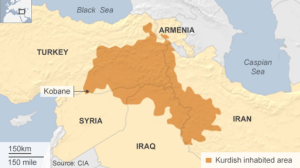12 Oct Iranian minority: Kurds
Iranian minority-Kurds
The topic is based on “Iranian minority Kurds“. It talks about India and its neighborhood- relations significance of Iranian minority-Kurds
Prelims: International Organization
Mains: GS II: International Relations, International conflicts
Why in the news?
A countrywide protest over the death of a young Iranian Kurdish woman in the custody of Iran’s morality police.

Pic: Iranian minority-Kurds
Who are Kurds?
- Kurds or also known as Kurdish people, these people are an Iranian ethnic and linguistic indigenous tribe of the highlands of Western Asia known as Kurdistan, which spans south-eastern Turkey, north-western Iran, northern Iraq, and northern Syria.
- It has been estimated that the population of these tribes is between 30 to 45 million
- They are an exclusive community, united through race, culture, and language, even though they have no standard dialect.
- They speak the Kurdish language as well as the Zara-Gorani language, which originated from the western Iranian branch of the Iranian language from the Indo-European language family.
- In the current times, the Kurds have been involved in many genocides and rebellions, as well as with ongoing armed conflicts in Turkish, Iranian, and Iraqi Kurdistan
- Kurds in Iraq and Syria have independent regions, while Kurdish movements continue to pursue greater cultural rights, autonomy, and independence throughout Kurdistan.
- They also practice a number of different religions and creeds, however, the majority are Sunni Muslims.
- Kurds are commonly known for being fearless fighters, and they have served as mercenaries in many armies over the centuries
- They are considered the world’s largest stateless ethnic group.
Why have they been considered a stateless tribe?
- The Kurds have never got nation-state status, except in Iraq, where they have a regional government called Iraqi Kurdistan.
- In the early 20th Century, many Kurds began to consider the creation of a homeland – and called for an autonomous Kurdistan
- Following World War I and the conquest of the Ottoman Empire, the victorious Western allies made a clause for a Kurdish state in the 1920 Treaty of Sevres.
- In spite of that, that hope was shattered three years later, when the Treaty of Lausanne laid down the boundaries of contemporary Turkey and made no such clause, leaving Kurds with minority status in all of the newly formed countries.
- Since then, for over 80 years, any move by Kurds to set up an independent state was brutally put to an end.
Kurdish-Iranian dispute
- The Kurdish-Iranian conflict is a kind of never-ending, separatist dispute between the western Iranian Kurdish opposition and the Iranian government.
- Iran never commissioned the same level of cruelty against its own Kurdish population but has always been constantly opposed to Kurdish separatism.
Kurdish-Iraq dispute
- The Iraqi-Kurdish dispute comprise a series of rebellions and wars by the Kurds against the central authority of Iraq during the 20th century, which started just after the defeat of the Ottoman Empire in World War I and lasted until the U.S. invasion of Iraq in 2003.
Kurdish-Turkish war
- The Kurdish-Turkish is an armed war between Turkey and various Kurdish insurgent groups who have either crippled the separation from Turkey to create an independent Kurdistan or make an effort to gain autonomy and greater political and cultural rights for Kurds inside the Republic of Turkey.
Sources
Daily Current Affairs for UPSC
Are you searching for Daily, weekly, and monthly current affairs for your UPSC exam preparation? Plutus IAS provides you with the daily current affairs that help you to prepare for your IAS exam. Get updated on Daily Current Affairs for the UPSC exam from us.
Download PDF




No Comments